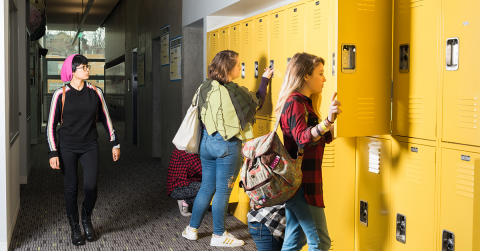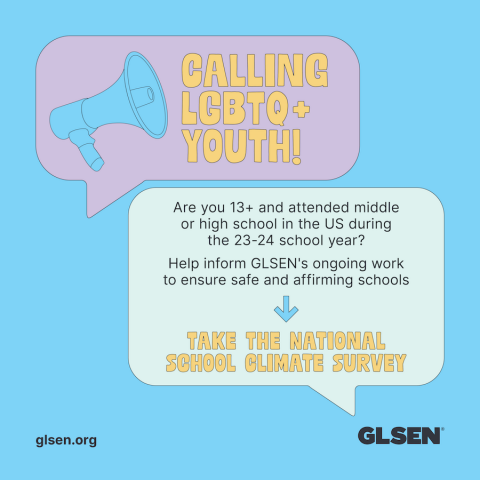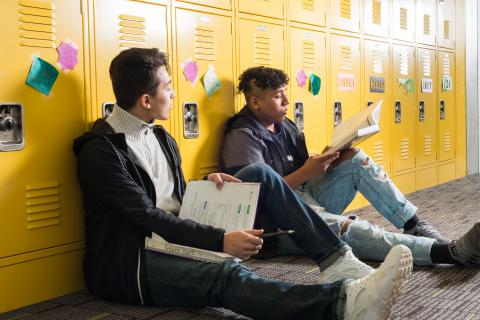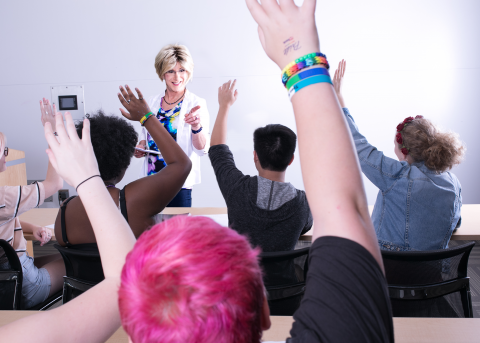
School Climate Survey
The National School Climate Survey is our flagship report on the experiences of lesbian, gay, bisexual, transgender, and queer youth in our nation’s schools. Our report includes information on LGBTQ+ middle and high school students’ experiences with discrimination, biased language, and availability and utility of supportive school resources. We also use this data to create research briefs on school climate in states across the U.S., as well as Puerto Rico.
GLSEN’s Local School Climate Survey is a free online survey tool for students, educators and other advocates to use to collect data on students’ experiences in their local school communities. Results from your survey can be used to advocate for safer and more inclusive programs and policies in your local schools and communities.
The National School Climate Survey
20 years of data show that school supports and resources can make a difference for LGBTQ+ youth.
The GLSEN 2021 National School Climate Survey report includes information on LGBTQ+ middle and high school students’ experiences, including:
- Hearing biased language, from both students and educators
- Experiences of harassment and assault
- Anti-LGBTQ+ discrimination
- Effects of a hostile school climate on educational outcomes and psychological well-being
- The availability and utility of supportive school resources
The survey has consistently indicated that specific school-based resources are related to a safer and more inclusive school climate, including:
- Supportive educators
- LGBTQ+-inclusive curriculum
- Inclusive and supportive policies
- Supportive student clubs, such as Gender and Sexuality Alliances (GSAs).
As the 12th installment of GLSEN’s National School Climate Survey, this report also includes greater insight into how LGBTQ+ student experiences have changed over the past 20 years, including:
- The emergence of LGBTQ+ identity terms over time
- Discrimination among transgender students over time
- Racist events among LGBTQ+ students of color over time
- LGBTQ+ immigrant students' feelings of safety regarding citizenship status over time
Local School Climate Survey
Conduct Your Own Local School Climate Survey
GLSEN has historically played an important role in obtaining national and state data on school climate. And we look for ways to use our expertise to assist in local data collection efforts. GLSEN’s Local School Climate Survey, which previously existed as a PDF on our website, is now available in a friendly and easy-to-use online format to help you learn about your local area.
GLSEN’s Local School Climate Survey is a free online survey tool for students, educators and other advocates to use to collect data on students’ experiences in their local school communities, such as, bullying, harassment, and bias based on gender, disability, sexual orientation, race/ethnicity, gender expression, body type and/or religion. Results from your survey can be used to advocate for safer and more inclusive programs and policies in your local schools and communities. It’s easy to get started - check out our online Local School Climate Survey tool today!
State Snapshots
State Snapshots use data from GLSEN's 2021 National School Climate Survey to examine the school experiences of LGBTQ+ middle and high school students, including hearing biased language, experiences of victimization, incidents of anti-LGBTQ+ discrimination, and access to resources and supports at school.
This state-specific data allows advocates, educators, administrators, and policymakers, among others, to evaluate school climate in their individual state, and to advocate for safer and more inclusive school environments for LGBTQ+ students across the nation, including LGBTQ+-supportive school policies, LGBTQ+-inclusive curriculum, and more.
State Snapshots feature state-level data drawn from GLSEN’s biennial National School Climate Survey. Begun in 1999, the survey is the only survey of its kind, documenting the experiences of LGBTQ+ youth in schools, including the extent of the challenges that they face and their access to the school-based resources that support their educational success and well-being.






















